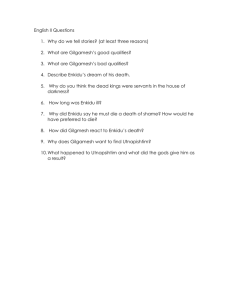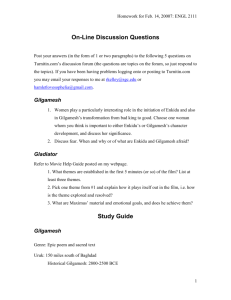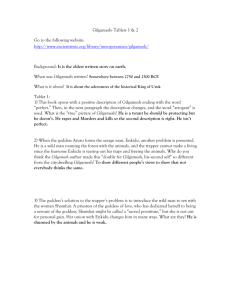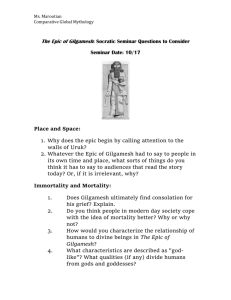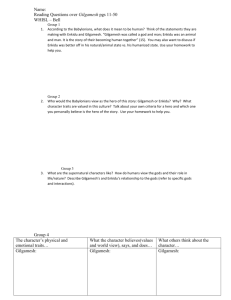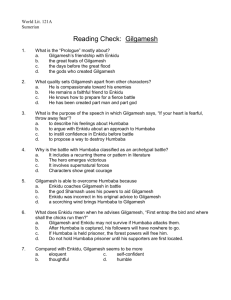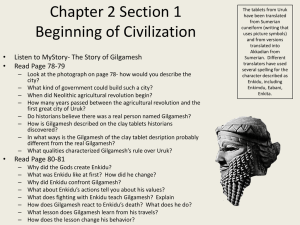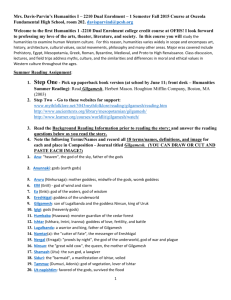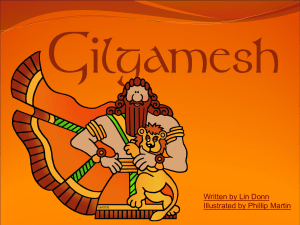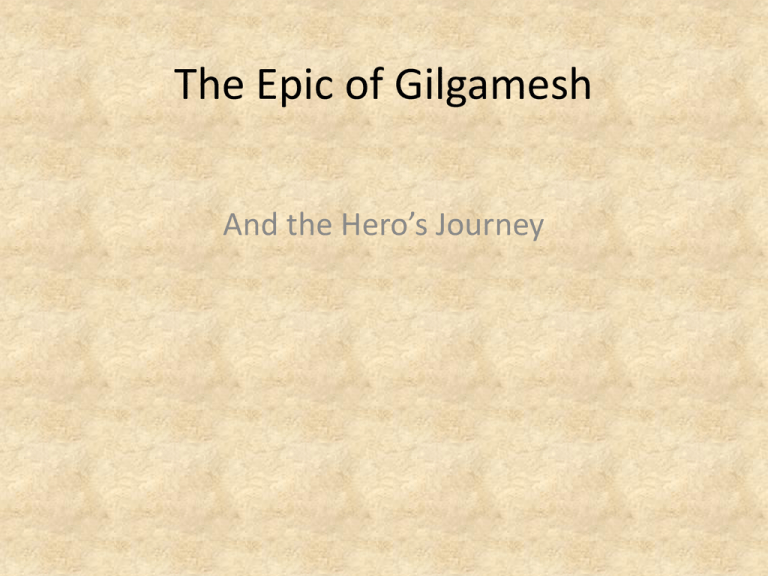
The Epic of Gilgamesh
And the Hero’s Journey
What is the Hero’s Journey?
• The Hero’s Journey, according to Joseph
Cambell is a frequently occurring story
archetype.
• Many, if not most stories from all over the
world, fit at least partially into this pattern.
Steps of the Hero’s Journey
• There are three basic
steps: The Departure, the
Initiation, and the Return.
• These are divided into 17
substeps, listed on the
right.
• Most stories do not have
all 17 steps.
1.
2.
3.
4.
5.
6.
7.
8.
The Call to Adventure
Refusal of the Call
Supernatural Aid
Crossing the 1st Threshold
The Belly of the Whale
The Road of Trials
The Meeting with the Goddess
Temptation away from the
true path.
9. Atonement with the Father
10. Apotheosis
11. The ultimate boon
12. Refusal of the Return
13. The Magic Flight
14. Rescue from Without
15. Crossing the Return Threshold
16. Master of the 2 Worlds.
17. Freedom to Live.
About ancient Mesopotamia
• Around the 8th millennium BCE, small farming communities
arose in the Fertile Crescent, particularly in an area of it
located between the Tigris and Euphrates rivers.
• Roughly 4000 years later, societies developed from these
communities in the form of city-states. They developed
(relatively) sophisticated political structures and created
irrigation systems.
• Eventually, empires formed under the rule of “God kings.”
Assyria, Babylon are
• However, the times were violent and brutal. The dams and
dikes could not protect against strong floods or droughts, and
war with barbarians or other city-states was a simple fact of
life.
• The religions reflected this reality: The Gods were harsh and
amoral, and the afterlife was a grim, hopeless place.
About Gilgamesh
• One king, Gilgamesh of Uruk, would
become a legend.
• According to the stories, he was 67
percent God.
• A powerful man, he was exceptionally
strong and also good-looking.
• However, his semi-divine nature made
him arrogant and impulsive.
• He also did not understand the
concept of death and spent a
significant amount of time trying to
conquer it, as he was still mortal.
Enkidu
• Gilgamesh ruled his city, Uruk, with an iron fist. So,
the gods made the wild man, Enkidu. He was tasked
with harassing Gilgamesh and keeping him too busy
to be oppressive.
• However, Gilgamesh “civilized” Enkidu by sending a
prostitute to have sex with him. Shortly afterwards,
Gilgamesh and Enkidu fought each other. The former
prevailed, but grew respect for the latter, and the
two became friends.
• Enkidu is the “voice of reason.” He tries to talk sense
into his more impulsive friend.
Introduction to the story.
• Gilgamesh is one example of a hero’s journey.
• Like many epics, the the story begins with the
narrator summarizing the story.
• The narrator says that Gilgamesh had been
explored all of the known world on his quest for
knowledge.
• He was built to perfection by the gods.
• In addition, his feats – the walls of Uruk – are still
here “today.”
About Humbaba
• Humbaba is the guardian of the Lebanese forests.
• Physically, he is a giant ogre who has a face made
of intestines.
• Specifically, he guards seven flames, or
“splendors” as they are called.
• Despite being a monster and antagonist, he
actually works for the gods.
• In addition, he has a house and employs servants.
The Battle with Humbaba
• Gilgamesh and Enkidu set out to kill Humbaba and take his
wood.
• Upon Encountering the ogre, Gilgamesh pray’s to
Shamash for help.
• Shamash responds by paralyzing Humbaba with wind.
• Gilgamesh and Enkidu set out to put out the seven
splendors before Humbaba’s servants can return with
weapons.
• When all but one fire is out, Humbaba begs for mercy.
• Gilgamesh considers sparing Humbaba, but Enkidu tells
him otherwise. They then kill Humbaba.
• With the guardian gone, the pair proceeds to deforest the
area.
The Death of Enkidu
• Some time later, Ishtar approaches
Gilgamesh and asks him to be her consort.
• Gilgamesh rejects her, pointing out that
she is an abusive lover.
• Angered, Ishtar sends a giant bull to kill
Gilgamesh and Enkidu. This fails, with the
pair killing the bull.
• Angered further, Ishtar makes Enkidu fall
ill.
• While he is sick, he tells Gilgamesh about
his dreams about death and the
(extremely grim) afterlife.
• These were prophecies. Enkidu dies
shortly afterwards.

